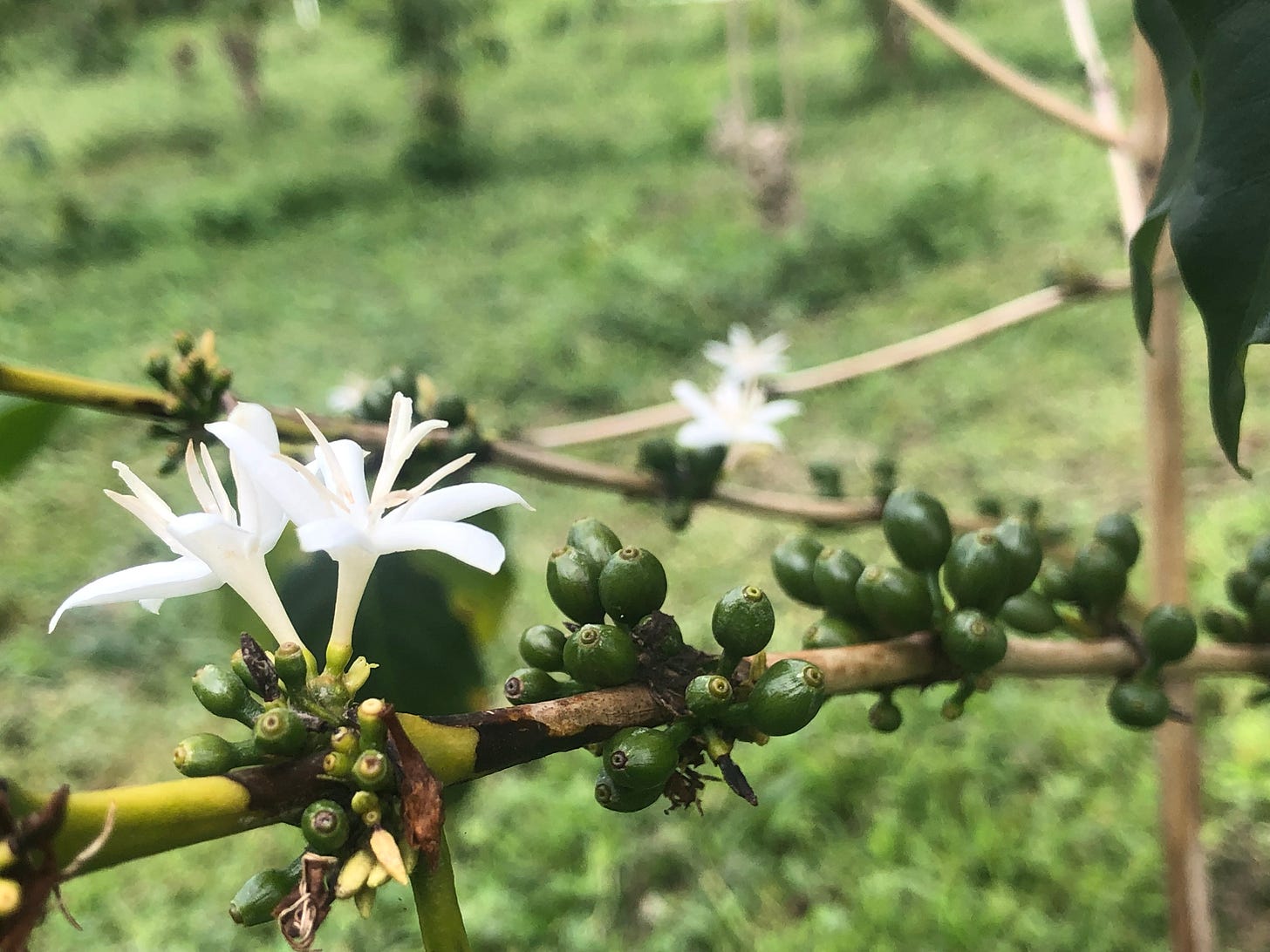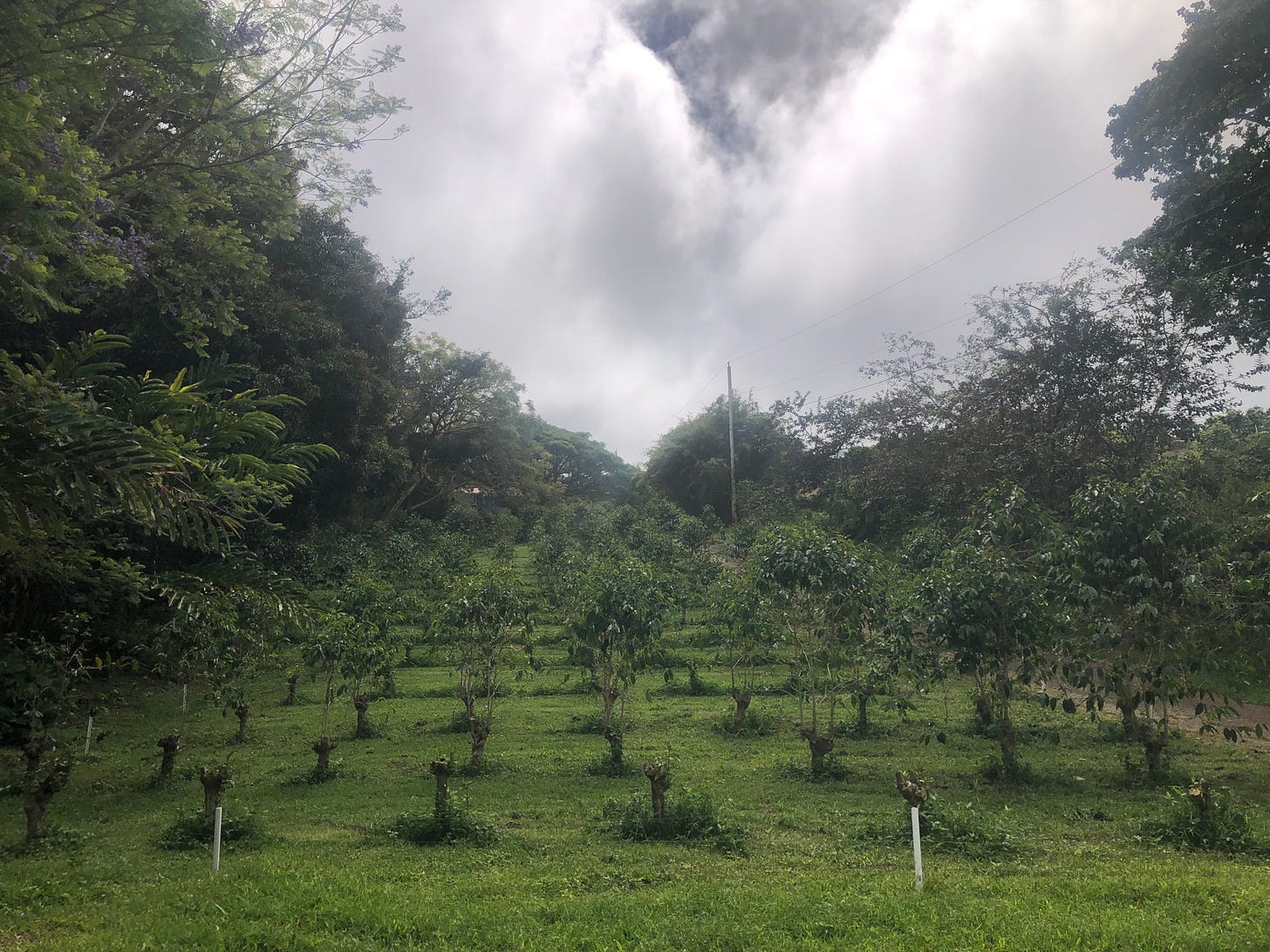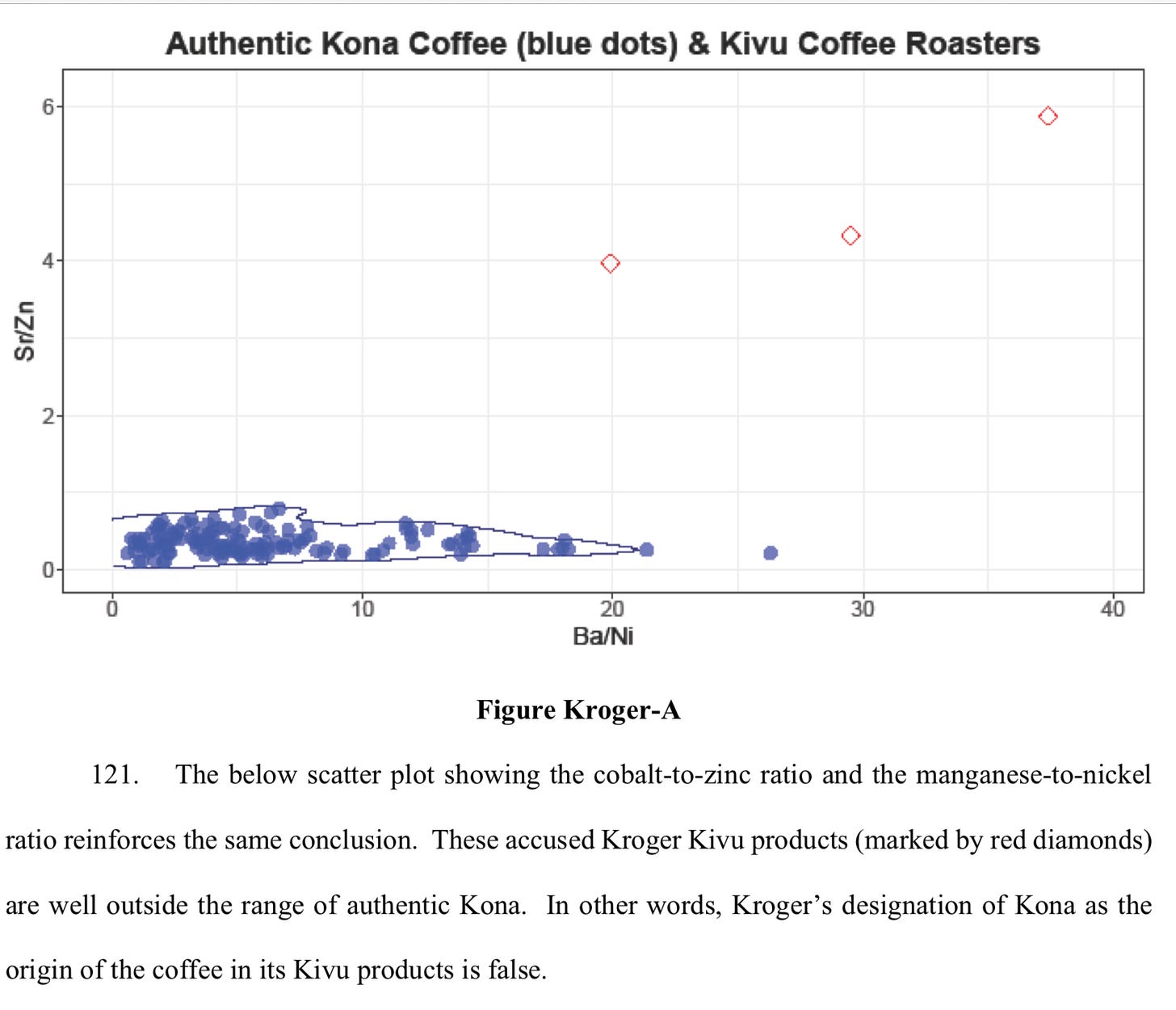Are You Drinking Real Kona Coffee?
Hawaiian Farmers Win Millions in Settling a Fake Labeling Case — But Has Anything Changed?
Coffee grown in Hawaii is expensive. Or at least it’s supposed to be.
Farms along the designated “Kona Coffee Belt” on the Big Island aren’t very big. There are maybe 750-800 operations averaging five acres apiece. Prices have been skyrocketing as the region deals with a leaf rust that’s wiped out 70% of production at some farms. Before the rust set in, “We were probably selling [coffee beans] for about $40-$45 a pound,” says Bruce Corker, owner of Rancho Aloha. “We’re now selling at $35 for a half pound.” Even at those elevated prices, he’s sold out.
He’s also just received part of a $41 million settlement in a lawsuit accusing everyone from Costco to Amazon to Hawaii’s own ABC Stores of misleading consumers by selling Kona coffee that didn’t contain Kona coffee.
That’s why I came to the town of Holualoa to visit Bruce. Located 1,400 feet up the slope of a volcano on the Big Island’s west side, it’s cooler and wetter here than down at the beach. It’s also perfect for producing coffee, as farmers grow trees on steep slopes in soil that drains water exceptionally well.
Bruce fell in love with coffee growing when he was a Peace Corps volunteer in Colombia after college. Then he went to law school (Harvard) and spent his career at Perkins Coie, a well-known firm in Seattle. He married a high school classmate, Lisa, who’d spent a year teaching in Colombia, and they raised a family.
When Bruce and Lisa became empty nesters, they dreamed of going back to Colombia to grow coffee. But by 2000, they realized the country wasn’t the safest place to be, at least then.
Instead, they settled in Kona, and in 2001, Bruce started Rancho Aloha. The farm currently has about 900 coffee trees planted on one and a half acres. “I enjoy the work of maintaining the trees and harvesting the crop, and marketing,” he tells me.
Turns out Bruce couldn’t quite leave his legal experience behind.
For about 30 years, coffee farmers in the Kona region have suspected that their beans weren’t getting into packages sold as “Kona coffee” at major retailers. They wanted the state to come up with labeling requirements, but the only regulation they managed to achieve was a law in the ‘90s mandating that anything carrying the “Kona” label had to contain 10% coffee from Kona. (Same with coffee from Maui, Kauai, etc.) The other 90% could be coffee from anywhere in the world. Farmers said it was like blending one orange with nine lemons and calling it “orange juice blend.”
But they were suspicious that even the 10% requirement was being ignored. The math didn’t work. Prices for “Kona coffee” were often too low to make sense. Farmers wondered if coffee blenders in Honolulu and elsewhere were putting any Kona coffee in the bags people bought.
Bruce says he felt powerless. “The state of Hawaii doesn’t protect farmers the way that many other states do.” Idaho protects its potatoes, Vermont has strong rules about labeling maple syrup, as does Georgia for Vidalia onions.
The Hawaiian farmers released a study in 2010 that claimed they were losing more than $14 million a year in “economic rent” to blenders selling coffee that consumers assumed was from Kona but mostly wasn’t. A United Nations report in 2018 said that Kona was missing out on the financial upside of protected “Geographical Indications,” because bags containing inferior coffee could hurt Kona’s reputation and lower profits.
Frustrated by government inaction, Bruce and another lawyer-turned-coffee farmer named Dexter Washburn wondered if they could bring a lawsuit on their own. They discovered a 2014 case before the Supreme Court involving the POM Wonderful company.
POM sued Coca-Cola for false advertising. Coke was selling a “Pomegranate Blueberry” juice that competed with POM’s own product, but the Coke beverage contained less than 1% pomegranate juice. It was mostly made up of apple and grape juices.
The high court ruled that POM could sue under the Lanham Act, which protects against false advertising and trademark infringement. Bruce thought, “Aha! Here we are. We ought to pursue this.” (Ironically, POM faced its own charges of making false claims that same year for promoting pomegranate juice to fight heart disease and prostate cancer).
In 2019, Bruce and other coffee farmers used the Lanham Act to sue more than 20 defendants in federal court. The defendants were mostly retailers or coffee blenders selling products branded as Kona coffee.
But how could the farmers prove their case?
The lawyers managed to find a private lab with a biologist from the University of Utah who analyzed coffee from Kona as well as coffee sold by the defendants. The lab found that the real stuff had unique ratios of elements not found elsewhere. Basically, Kona coffee is very volcanic.
For example, here are the test results comparing private label “Kona coffee” sold at Kroger stores to real Kona coffee samples. The blue dots represent the makeup of true Kona coffee, and the red diamonds represent the makeup of the coffee at Kroger.
Defendants disputed the lab results, but the case was settled before going to court. Some defendants were dismissed, but the dozen that remained agreed to pay farmers tens of millions of dollars without admitting guilt.
Of the $41 million in settlement money, Bruce says about half went to lawyers who worked the case on contingency, and also to other fees. “The total that I’ve received is probably in the neighborhood of $10,000,” he says. Not a lot. Still, “What’s important about the lawsuit is the message that counterfeiters are at risk of being held to account.”
So… what’s the big deal? What makes this coffee so special?
Well, if you’ve ever tasted 100% Kona coffee, you know that it’s smooth, flavorful and well-balanced. And when you roast the raw beans (as my husband did), the smell is amazing. The beans pop like popcorn, not once, but twice.
Now Bruce and other farmers are pushing legislation (again) to force Kona coffee products to contain at least 50% of coffee that’s actually from Kona.
Bills introduced this year in both chambers of the Hawaii state legislature would force blenders to do that, but Bruce doesn’t have high hopes. “It’s probably gonna die,” he says. “We’ll see.”
When I ask him how coffee farmers plan to enforce the settlement going forward and prevent mislabeling, he replies, “That’s one of the problems… I think it’s happening again.” He has no proof.
Mostly he feels disappointed in the way he believes Hawaii has ignored farmers on the outer islands. “Why hasn’t common sense prevailed over in Honolulu for 30 years, that you support your farmers and you don’t fool the consumer?”
That may change now that the lawsuit and settlement have made national news with coverage in the New York Times. (The Times also reported on political corruption in Honolulu.) Hawaii’s macadamia nut farmers are now pushing their own label legislation.
The issue has certainly gotten the attention of locals. My favorite story last week through “The Coconut Wireless” (aka Nextdoor) was about an FBI raid around a coffee store in downtown Kona. “They were selling coffee as Kona coffee that wasn’t actually Kona coffee,” one person speculated.
Doubtful.
But the comment illustrates how truth in labeling has become more important here. Will it resonate with mainland consumers? How do coffee lovers make sure they’re actually buying Kona coffee? Bruce Corker says there’s only one surefire way. “Buy from the farmer.”
It won’t be cheap, but it will be smooth.










Hooboy, have you struck a nerve here! As you may recall, I am a coffee geek and have been roasting my own beans for I-don't-remember how many years. 1) Kona's coffee growers are 100% correct in their gripe. Mislabeling is just wrong. 2) When I buy Kona, I get it from Purple Mountain Coffee - and it is always very nice and beautifully prepared. I probably would not be able to tell it apart from other quality Konas. 3) BUT in my opinion, Kona, as nice as it is, does not compete in taste with good Colombian, Guatemalan, Panamanian, Kenyan, Ethiopian and other origins. My opinion only. Coffee preference is highly personal. It's just a good, mild coffee. 4) Kona is expensive... but there are others even more expensive. (Google "The 10 Most Expensive Coffees in the World"). My pick, for taste, is Hacienda Esmeralda in Panama, which grows a variety called "Gesha" (not Geisha) that can be fabulous... but as an agricultural product, varies in taste from season to season.
....... there. Don't roast your beans too dark (Charbucks, do you hear me?) and enjoy. I won't bore you further.
I love Kona Coffee. I save it for special treats days because it's so pricy, and I understand why. Your article has really opened my eyes on this Jane, Thank you!